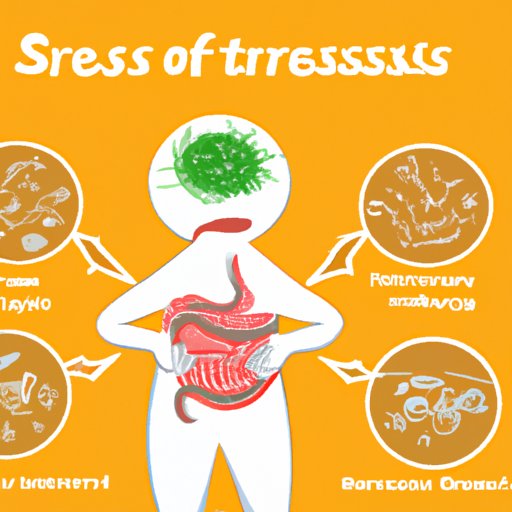
I. Introduction
Stress is an inevitable part of life, but it can also have significant effects on the body. When we experience stress, we tend to feel it in our mental and emotional states, but it can also have physical consequences, including the disruption of our digestive system. Understanding the role of stress in our digestion is key to managing it and keeping our gut healthy.
II. Gut Reaction: The Link Between Stress and Digestive Issues
Our digestive system is a complex network that is responsible for breaking down and absorbing food, eliminating waste, and fighting off harmful bacteria. The gut-brain axis, which connects the brain and the gut, is essential in regulating these functions. When we experience stress, it can disrupt this delicate balance, leading to a range of digestive issues such as indigestion, bloating, and diarrhea.
III. When Stress Takes a Toll on Your Stomach: Understanding the Connection Between Mind and Gut
Our mind and gut are closely connected, and stress can impact the health of the gut directly. For example, chronic stress can negatively affect the immune system and increase our susceptibility to infections, which can lead to inflammation in the gut. This can, in turn, cause a range of health problems such as irritable bowel syndrome and inflammatory bowel disease.
IV. The Digestive Side Effects of Stress: How to Keep Your Gut Happy
To keep our gut healthy, it’s essential to manage our stress levels. There are several strategies we can use to improve digestion and reduce stress, including exercise, relaxation techniques, and getting enough sleep. Additionally, practicing good gut health habits, such as eating a balanced diet, staying hydrated, and avoiding foods that irritate your digestive system, can also help reduce the impact of stress on our gut.
V. Stress and Your Digestion: The Impact of Anxiety on Your Body’s Second Brain
The enteric nervous system, commonly referred to as the “second brain,” is a complex system of neurons that regulates digestion, from the esophagus to the rectum. When we experience anxiety, it can cause physical symptoms such as nausea and abdominal pain by disrupting the enteric nervous system’s functions.
VI. Don’t Let Stress Eat Away at Your Gut Health: Tips for Managing Digestive Issues
Managing digestive issues caused by stress involves addressing the underlying causes of the stress. Simple strategies such as deep breathing, meditation, and gentle exercise can all help reduce stress levels and, in turn, improve gut health. Additionally, adding foods rich in probiotics and prebiotics to your diet can help rebalance your gut microbiome and reduce the symptoms of digestive disorders.
VII. From Nervousness to Nausea: Examining How Stress Manifests in the Digestive System
Stress can cause physical symptoms such as nausea and vomiting, which can impact our daily lives. Digestive problems caused by stress can also lead to long-term health issues such as ulcers and autoimmune disorders. Seeking support from friends, family, or a professional may help mitigate the effects of stress on our bodies and reduce our risk of developing these conditions.
VIII. The Gut-Brain Connection: Exploring How Stress Affects Your Digestive Health
The gut-brain axis and enteric nervous system are both involved in regulating our digestive functions, and the impact of stress on these systems can be significant. Managing stress through meditation, breathing exercises, and other relaxation techniques can help reduce the negative impact of stress on our digestive health.
IX. Conclusion
Stress and digestive health are closely linked, and managing stress is an essential part of maintaining optimal gut health. By understanding the relationship between stress and our digestive system, we can begin to take steps to reduce the physical effects of stress on our bodies and improve overall well-being.





